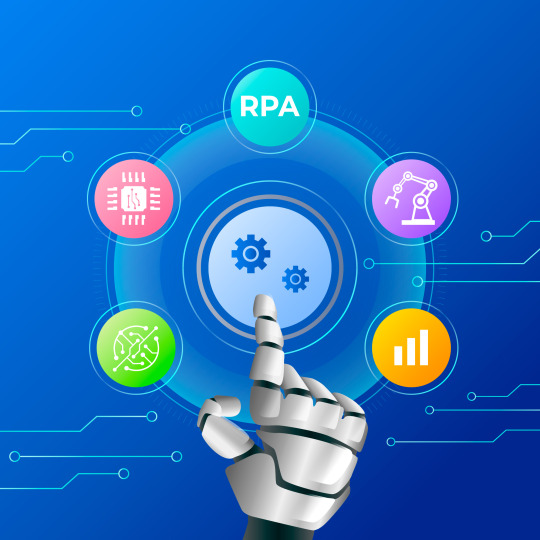#robotic process automation software
Explore tagged Tumblr posts
Text
Unlocking Efficiency and Innovation: The Role of Robotic Process Automation (RPA)

In today's fast-paced and competitive business environment, organizations are constantly seeking ways to improve efficiency, reduce costs, and increase productivity. Robotic Process Automation (RPA) has emerged as a powerful tool that can help businesses achieve these objectives.
What is Robotic Process Automation (RPA)?
Robotic Process Automation (RPA) is a technology that allows businesses to automate repetitive, rule-based tasks. It uses software robots, also known as "bots," to mimic human actions and interact with digital systems. These bots can log into applications, navigate through screens, input data, and complete tasks just like humans would.
The Role of RPA in Business:
RPA can be used to automate a wide range of tasks across various industries and departments. Here are some examples:
Finance and Accounting: Automating tasks such as accounts payable and receivable, invoice processing, and financial reporting.
Customer Service: Automating tasks such as answering FAQs, resolving customer inquiries, and processing orders.
Human Resources: Automating tasks such as onboarding new employees, processing payroll, and managing benefits.
IT: Automating tasks such as provisioning accounts, managing user access, and deploying software updates.
Impact of RPA on Businesses:
Implementing RPA can offer numerous benefits to businesses, including:
Increased efficiency and productivity: RPA can automate time-consuming and tedious tasks, freeing up employees to focus on more strategic and value-added activities.
Reduced costs: RPA can help businesses save money on labor costs, as well as reduce errors and compliance risks.
Improved accuracy and compliance: RPA bots are programmed to follow specific rules and procedures, which can help to improve accuracy and compliance with regulations.
Enhanced process visibility and control: RPA provides businesses with a clear view of their processes, which can help them identify and address bottlenecks.
Improved customer satisfaction: RPA can help businesses improve customer satisfaction by automating tasks such as order processing and customer service interactions.
RPA Services:
Implementing RPA successfully requires a partner with expertise in the technology and a deep understanding of business processes. A comprehensive RPA solution should include the following services:
Document AS-IS Process: This involves mapping out the existing process to identify areas for automation.
Design & Development of Bots, workflows, and forms for process automation: This includes designing and developing the software robots that will automate the tasks.
Bot license (We will use the appropriate underlying technology): This provides access to the software robots and the underlying technology platform.
Infrastructure: This includes setting up the necessary infrastructure to support the Robotic Process Automation (RPA) solution.
Production Deployment of the Bots: This involves deploying the bots to production and monitoring their performance.
RPA support: This includes ongoing support for the RPA solution, such as troubleshooting and maintenance.
Test & Deploy bots to production: This involves testing the bots in a production environment and making any necessary adjustments before they are deployed to full production.
Configuration data changes: This involves making changes to the configuration data of the bots as needed.
Password updates: This involves updating the passwords of the bots as needed.
Errors in executing the Bots: This involves resolving errors that occur during the execution of the bots.
Determining the “root cause” of a recurring issue or incident & recommendations: This involves identifying the root cause of a recurring issue or incident and recommending solutions to prevent it from happening again.
Infrastructure/application related issues: This involves resolving issues with the infrastructure or applications that the bots are interacting with.
Conclusion:
RPA is a powerful technology that can have a significant impact on businesses of all sizes. By automating repetitive tasks, RPA can help businesses improve efficiency, reduce costs, and increase productivity. However, it is important to choose a reputable Robotic Process Automation (RPA) companies with the expertise and experience to help you implement a successful RPA solution.
Ready to embrace the power of RPA?
Contact us today to learn more about how RPA can help your business achieve its goals.
#robotic process automation#robotic process automation rpa#rpa automation#robotic process automation software#rpa software#robotic process automation companies#robotic process automation technology#robotic process automation in healthcare#robotic process automation in banking#rpa solution#robotic process automation for finance#process automation solution#robotic process automation services#robotic process automation for insurance#rpa system#what is rpa automation#robotic process automation solution#robotic process automation benefits#robotic process automation consulting#robotic process automation consultant#rpa service provider#rpa consulting services
2 notes
·
View notes
Text
Bridge the Gap Between Operational and Analytical Data
Businesses struggle with disconnected operational and analytical data, leading to slow decision-making and inefficiencies. Integrating real-time data processing with analytics enables seamless insights, better forecasting, and smarter strategies. By unifying data sources, organizations enhance agility and performance. It's time to bridge the gap between operational and analytical data for success.
#robotic process automation software#tools for data visualization#unified data analytics platform#robotic process automation#data visualization tools
0 notes
Text
Streamline Workflow Automation with AI | Open Chatbot Solutions
Boost productivity with Ziobot’s AI chatbot. interact with PDFs, websites, and videos using our advanced AI-powered solutions & workflow automation.
#Workflow automation with AI#open chatbot ai#robotic process automation software#Employee productivity Software#Ziobot chatbot Features
0 notes
Text
Digital Process Automation Software | Experience Led Transformation
Acquis cortico-X is a revolutionary cognitive enhancement pill developed to improve mental performance and focus. Acquis cortico-X can help you digital process automation services unlock your brain's potential and reach optimal cognitive function.
#cloud infrastructure services#digital business transformation services#experience led transformation#it modernization strategy company#it service delivery optimization software#workflow optimization services#digital workflow management services#robotic process automation software#it infrastructure automation services
0 notes
Text

Unlock Business Efficiency with Rapidor's Robotic Process Automation Software
Tired of managing business chaos? Rapidor is your comprehensive solution! Streamline workflows, gain real-time insights, and enhance quality control effortlessly. Focus on business growth while we automate processes from order to delivery, ensuring efficient operations at every step. Discover the power of Rapidor – Simplifying Business Excellence!
Visit https://www.rapidor.co/
0 notes
Text

IoT Solutions in Manufacturing Solutions by Mobiloitte
#Advanced Manufacturing Solutions#Manufacturing Innovation#Manufacturing Technology#Smart Manufacturing#Industrial Automation#Manufacturing Efficiency#Production Optimization#Digital Manufacturing#Manufacturing Industry Solutions#Robotics in Manufacturing#AI in Manufacturing#Manufacturing Process Improvement#IoT in Manufacturing#Manufacturing Software#Global Manufacturing Innovation#Advanced Production Techniques.
0 notes
Text
Factory Automation in pune | India
The total automation of the production process is what we mean when we talk about factory automation. Using technologies like robotic arms, hydraulic systems, and pneumatic systems to automate the construction of increasingly complicated systems is standard procedure in the manufacturing industry.
#Partner in Factory Automation#Electrical & software solutions#Process Automation Partner#Revolutionizing Process Automation#Transforming Automotive Manufacturing with Advanced Automation#WAGO Technical Solutions#Electrical & Electronic Interfaces#process automation robotics india
0 notes
Text
youtube
Are slow approvals, negotiation headaches, and managing channel partners slowing down your sales process? RSoft Realtors Robot is here to change that!
#Real estate CRM#Sales automation software#Streamline real estate sales#RSoft Realtors Robot demo#Real estate lead scoring#Smart lead routing for real estate#Real estate approval process software#Channel partner management CRM#Boost real estate sales productivity#AI for real estate sales#Realtors CRM tool#Sales cycle automation real estate#Youtube
0 notes
Text

𝐁𝐫𝐞𝐚𝐤 𝐓𝐡𝐫𝐨𝐮𝐠𝐡 𝐁𝐮𝐬𝐢𝐧𝐞𝐬𝐬 𝐁𝐚𝐫𝐫𝐢𝐞𝐫𝐬! Is inefficiency, errors, or missed opportunities holding back your business growth? 𝐒𝐡𝐚𝐫𝐞 𝐘𝐨𝐮𝐫 𝐏𝐚𝐢𝐧 𝐏𝐨𝐢𝐧𝐭! 𝐃𝐚𝐭𝐚 𝐎𝐯𝐞𝐫𝐥𝐨𝐚𝐝: Too much data, too little insight? 𝐌𝐚𝐧𝐮𝐚𝐥 𝐄𝐫𝐫𝐨𝐫𝐬: Time-consuming corrections, reputations at stake? 𝐈𝐧𝐞𝐟𝐟𝐢𝐜𝐢𝐞𝐧𝐭 𝐎𝐩𝐞𝐫𝐚𝐭𝐢𝐨𝐧𝐬: Slow processes, missed opportunities? 𝐎𝐭𝐡𝐞𝐫 (comment below)? 𝐆𝐞𝐭 𝐒𝐭𝐚𝐫𝐭𝐞𝐝! Comment with your questions or concerns and we'll provide expert guidance.
#artificial intelligence#custom software development#data analytics#ai#automation#it consulting#transformation#digital transformation#cloud computing#robotic process automation
0 notes
Text

Retailers face inventory mismanagement, demand fluctuations, and poor customer insights, impacting sales and profitability. Infoveave Pvt. Ltd. delivers retail analytics solutions, utilizing AI to track consumer behavior, forecast demand, and optimize pricing. With real-time data, retailers enhance supply chain efficiency, boost customer engagement, and maximize revenue through data-driven strategies.
#tools for data visualization#data visualization tools#unified data analytics platform#data visualization softwares#unified data management platform#data analytics tools#robotic process automation software
0 notes
Text
Sneak Peak into ServiceNow’s Robotic Automation Automation
What exactly is a Robotic Process Automation?
Robotic Process Automation involves taking advantage of software robots to automate sequential and rule-based tasks or processes, thereby enhancing productivity and decreasing dependence on manual work.
“ ServiceNow RPA can automate a wide range of tasks across various departments and functions, including data entry, form filling, report generation, data extraction, and more. This flexibility allows organizations to automate processes tailored to their specific needs. “
What does ServiceNow RPA signify?
ServiceNow's Robotic Process Automation (RPA) empowers organizations to automate continuous tasks that require manual interference with the help of software Robots. In the new era, ServiceNow RPA means that the robotic automation capabilities are smoothly integrated within the ServiceNow platform. These bots are capable of achieving a wide array of tasks such as data entry, extraction, form filling, and more, directly within the ServiceNow environment. The main objective of ServiceNow RPA is to boost operational efficiency, minimize errors, and liberate employees to concentrate on strategic and value-added activities.
Elements of ServiceNow RPA:
ServiceNow RPA typically offers a development environment that requires No-Code/Low-Code Development.
Workflow Automation automates tasks and workflows including the interactions with various software systems, applications, and databases.
ServiceNow RPA employs bots to replicate human actions such as clicking, typing, and data copying to execute tasks.
ServiceNow RPA ensures the protection of sensitive data and compliance with regulatory standards in automation processes.
It often includes pre-built integrations with third-party applications, databases, web services, etc.
Different kinds of RPA robots
Attended Robot refers to software robots or bots that work alongside human employees to assist with specific tasks. Unlike unattended robots, which operate autonomously without human intervention, attended robots require human oversight and collaboration. These robots typically interact with users in real-time, either on their desktops or within specific applications, to provide support, automate repetitive tasks, and enhance productivity.
An unattended Robot is a software robot/bot that operates single-handedly without human intervention. Unlike attended robots, which work alongside humans and require human oversight, unattended robots are designed to execute tasks independently. They typically operate on servers or virtual machines and can perform repetitive and rule-based tasks without the need for human interaction.
ServiceNow's development into Robotic Process Automation
Acknowledging the increasing significance of automation in contemporary enterprises, ServiceNow has integrated RPA into its platform. This expansion enables organizations to uphold their automation activities by integrating software bots into their workflows. With this addition, ServiceNow has broadened its suite of offerings to encompass RPA, thereby providing a unified solution for process automation.
ServiceNow RPA significance
ServiceNow RPA holds significance for several reasons:
Enhanced Efficiency: By automating repetitive and rule-based tasks, ServiceNow RPA streamlines workflows and increases operational efficiency. This allows employees to focus on more strategic and value-added activities.
Reduced Errors: Automation minimizes the likelihood of human error, leading to improved accuracy and reliability in task execution.
Cost Savings: With tasks automated through RPA, organizations can reduce labor costs associated with manual processes, leading to significant cost savings in the long run.
Integration: ServiceNow RPA seamlessly integrates with other ServiceNow applications, providing a unified platform for process automation across the organization.
“ServiceNow RPA offers a comprehensive solution for organizations looking to streamline their operations, increase efficiency, and drive digital transformation through automation.”
What are the processes for automating ServiceNow RPA?
When considering processes to automate with ServiceNow RPA, focus on tasks that are repetitive, rule-based, and prone to human error. A few to keep in mind are:
Report Generation
Data Entry and Retrieval
Data Validation
Notification and Alerts
File Management
User Onboarding and Offboarding
Invoice Processing
Service Desk Operations
Inventory Management
Data Migration
#ServiceNow Robotic Process Automation (RPA)#Workflow Automation#Software Robots#Operational Efficiency
0 notes
Text
Business Automation Tool & RPA Software for Efficiency
Business automation tool'AI Product Companiesrobotic process automation software
Boost efficiency with our business automation tools and robotic process automation software. Simplify workflows and unlock productivity for your enterprise.
0 notes
Text
Digital Business Transformation Services | IT Modernization Services
Acquis cortico-X will help you unleash your mental superpowers and maximise the capacity of your brain. Acquis cortico-X is the key to IT process management automation unlocking optimal mental performance and reaching your goals.
#acquis consulting#business process automation services#enterprise automation solutions#automated it operations services#devops and automation solutions#it process automation consulting#workflow optimization services#robotic process automation software#it service automation software
0 notes
Text
Rapidor | Streamlining Your Business with Robotic Process Automation
Robotic Process Automation (RPA) is transforming the way businesses operate, streamlining processes, and boosting productivity. At Rapidor, we're at the forefront of this automation revolution, providing cutting-edge RPA solutions tailored to your needs. Let's dive into the world of RPA and see how Rapidor can empower your organization.
Visit https://www.rapidor.co/
#Robotic Process Automation#Business management software#business process automation software#business process automation#robotic process automation software
0 notes
Text
Unveiling the Importance of RPA Testing
Thorough testing becomes essential when companies employ Robotic Process Automation (RPA) to automate tasks and enhance efficiency. Ensuring that automated processes operate seamlessly and deliver the intended outcomes underscores the importance of RPA testing.
Understanding RPA Testing
RPA testing Sydney is super important in the process automation journey. It’s all about checking if the automated tasks work well in meeting its objective. Unlike regular software tests, RPA testing faces its own set of challenges because automated work is always changing and involves different types of applications and integrations.
Know more: Unveiling the Importance of RPA Testing (adactin.com)
#rpa testing services sydney#rpa testing sydney#robotic process automation sydney#software testing services sydney
0 notes
Text
In the dynamic landscape of Robotic Process Automation (RPA), this article offers strategic guidance. It emphasizes the critical balance between swift implementation and long-term considerations. The challenges of process identification are tackled, underscoring the need for simulations and a process-oriented mindset. The article warns against potential pitfalls like 'Shadow IT,' advocating for IT involvement and comprehensive planning. It clarifies the distinction between task and process automation, stressing the importance of a well-orchestrated process layer for flexibility. The narrative encourages organizations to view RPA not just for short-term gains but as a tool for enduring process leverage. Embracing Business Process Management (BPM), it highlights the synergy between BPM and RPA for holistic impact on operational efficiency and adaptability.
0 notes